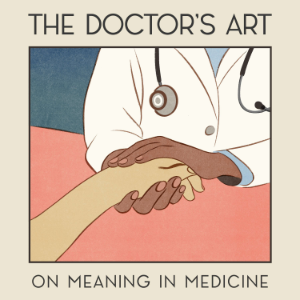
The Doctor's Art
Medical
The practice of medicine–filled with moments of joy, suffering, grace, sorrow, and hope–offers a window into the human condition. Though serving as guides and companions to patients’ illness experiences is profoundly meaningful work, the busy nature of modern medicine can blind its own practitioners to the reasons they entered it in the first place. Join resident physician Henry Bair and oncologist Tyler Johnson as they meet with doctors, patients, leaders, educators, and others in healthcare, to explore stories on finding and nourishing meaning in medicine. This podcast is for anyone striving for a deeper connection with their medical journey. Visit TheDoctorsArt.com for more information.
Location:
United States
Description:
The practice of medicine–filled with moments of joy, suffering, grace, sorrow, and hope–offers a window into the human condition. Though serving as guides and companions to patients’ illness experiences is profoundly meaningful work, the busy nature of modern medicine can blind its own practitioners to the reasons they entered it in the first place. Join resident physician Henry Bair and oncologist Tyler Johnson as they meet with doctors, patients, leaders, educators, and others in healthcare, to explore stories on finding and nourishing meaning in medicine. This podcast is for anyone striving for a deeper connection with their medical journey. Visit TheDoctorsArt.com for more information.
Language:
English
Website:
http://thedoctorsart.com
Email:
henry.c.bair@gmail.com
Joyspan and Aging | Kerry Burnight, MD
Duration:00:53:50
Don’t Just Do Something, Stand There | Brewer Eberly, MD
Duration:00:53:24
The Three Dimensions of a Fulfilling Life | Shigehiro Oishi, PhD
Duration:00:56:31
A Humanist Approach to Chaplaincy | Greg Epstein
Duration:00:58:15
The Morals and Morale of Healthcare Providers | Farr Curlin, MD
Duration:01:01:57
The Mandate of Medicine | Jessica Zitter, MD
Duration:00:52:56
The Power of Data Driven Narrative in Public Health | David Agus, MD
Duration:00:59:10
Medicine at the Margins of Society | James O’Connell, MD
Duration:01:00:24
A Collective Voice for All Physicians | Bruce Scott, MD
Duration:00:54:44
Living a Full Life Amidst Illness | On Site at George Mark Children’s House
Duration:00:47:00
To Create a Medical School | Sharmila Makhija, MD, MBA
Duration:00:54:58
Artificial Intelligence and the Physician of Tomorrow | Michael Howell, MD, MPH
Duration:01:01:36
Human Experience in a Digital World | Christine Rosen
Duration:01:01:58
Virtue and Good Medicine | John Rhee, MD, MPH
Duration:00:55:18
A Rebirth of Passion and Compassion | Joseph Stern, MD
Duration:00:57:03
Healing, Presence, and Comfort Amid Child Loss | Shekinah Eliassen
Duration:00:58:42
A Doctor’s Reflection on Race and Medicine | Damon Tweedy, MD
Duration:00:53:41
All Physicians are Leaders | Peter Angood, MD
Duration:00:56:41
How Not to Die | Michael Greger, MD
Duration:00:54:15
A Prescription for Connection | Julia Hotz
Duration:01:05:00